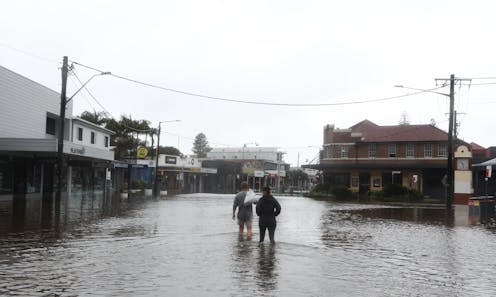Natural disasters hit disadvantaged people the hardest, but we can lessen the impact
- Written by Misha Ketchell, Editor & Executive Director, The Conversation

Thousands of people have been displaced by the floods in New South Wales and Queensland. After the first flooding event in late February, over 5,000 homes were rendered uninhabitable[1] across the two states.
Less than a month later, as residents were cleaning up the damage from the first disaster, the Northern Rivers region was hit by a second major flooding event[2].
Yet again, Australia is reeling from the effects of climate-change induced natural disasters.
As the planet warms, we will unfortunately face more natural disasters. We need to anticipate and plan for future disasters to minimise their impact and prevent them from compounding disadvantage.
Last year, The Conversation published over 50 articles[3] examining how the burden of disaster falls disproportionately on disadvantaged individuals, families and communities.
This series[4], supported by the Paul Ramsay Foundation, looked at how we are failing these people who have been impacted by disaster. Academic experts suggested concrete ways we can do better, including government policies to break the cycles of disadvantage which are exacerbate by such events.
The team at the Paul Ramsay Foundation have summarised some of the key findings from the series in a post on Five ways building disaster resilience could disrupt the cycle of disadvantage[5].
To start learning about disaster resilience in the face of climate-change, here is a selection of stories from the series:
Kate Isabel Booth, Senior Lecturer in Human Geography and Planning, University of Tasmania
Even if you’re well covered, your area may struggle long after a disaster if most locals don’t have enough home and/or contents insurance. Search our map by postcode or suburb name to check your area.
Antonia Settle, McKenzie Postdoctoral Research Fellow, The University of Melbourne
As climate change intensifies extreme weather events, home and building insurance premiums have been rising. This leads many people to drop their insurance coverage, risking financial disaster when the next disaster hits.
The Morrison government has responded to this issue by committing A$10 billion to a “reinsurance pool”. But this is the exact policy the Australian Competition and Consumer Commission recommended against.
Michelle Villeneuve, Associate Professor, University of Sydney
Australians with disability are disproportionately affected by disasters such as fire, floods, cyclones and heatwaves. Yet we rarely hear their perspectives and insights on what’s needed to ensure they’re not left stranded when disaster strikes.
References
- ^ rendered uninhabitable (www.afr.com)
- ^ second major flooding event (theconversation.com)
- ^ over 50 articles (theconversation.com)
- ^ series (theconversation.com)
- ^ Five ways building disaster resilience could disrupt the cycle of disadvantage (paulramsayfoundation.org.au)
- ^ Subscribe to our newsletter (theconversation.com)

















